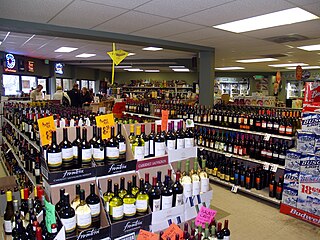Related Research Articles

The Liquor Control Board of Ontario (LCBO) is a Crown corporation that retails and distributes alcoholic beverages throughout the Canadian province of Ontario. It is accountable to the Legislative Assembly through the minister of finance. It was established in 1927 by the government of Premier George Howard Ferguson to sell liquor, wine, and beer. Such sales were banned outright in 1916 as part of prohibition in Canada. The creation of the LCBO marked an easing of the province's temperance regime. By September 2017, the LCBO was operating 651 liquor stores.

Brewers Retail Inc., doing business as The Beer Store, is a privately-owned chain of retail outlets selling beer and other malt beverages in the province of Ontario, Canada.

A liquor store is a retail shop that predominantly sells prepackaged liquors – typically in bottles – usually intended to be consumed off the store's premises. Depending on region and local idiom, they may also be called an off-licence, off-sale, bottle shop / bottle-o liquor store (US) or other similar terms. Very limited number of jurisdictions have an alcohol monopoly. In US states that are alcoholic beverage control (ABC) states, the term ABC store may be used.
Alcoholic beverage control states, generally called control states, less often ABC states, are 17 states in the United States that, as of 2016, have state monopoly over the wholesaling or retailing of some or all categories of alcoholic beverages, such as beer, wine, and distilled spirits.
The Ontario Temperance Act was a law passed in 1916 that led to the prohibition of alcohol in Ontario, Canada. When the Act was first enacted, the sale of alcohol was prohibited, but liquor could still be manufactured in the province or imported. Strong support for prohibition came from religious elements of society such as the Ontario Woman's Christian Temperance Union, which sought to eliminate what it considered the societal ills and vices associated with liquor consumption, including violent behaviour and familial abuse. Historically, prohibition advocates in Ontario drew inspiration from the temperance movements in Britain and the United States. The Act was repealed in 1927.

The Alberta Gaming, Liquor and Cannabis Commission (AGLC) is an agency of the government of the Canadian province of Alberta, and regulates alcoholic beverages, recreational cannabis, and gaming-related activities. References to cannabis were added to AGLC's name and governing legislation as cannabis in Canada moved towards legalization in 2018. AGLC was created in 1996 as the Alberta Gaming and Liquor Commission by combining the responsibilities and operations of the Alberta Liquor Control Board (ALCB), Alberta Lotteries, the Alberta Gaming Commission, Alberta Lotteries and Gaming and the Gaming Control Branch. The current Chief Executive Officer as of 2020 is Kandice Machado.

Alcohol Beverage Services, previously known as the Department of Liquor Control is a government agency within the County of Montgomery, Maryland and is the wholesaler of beer, wine and spirits alcoholic beverage throughout the county's 507-square-mile (1,310 km2) area. Montgomery County Department of Liquor Control also exercises control over retail sales for off-premises consumption, either through government-operated package stores or designated agents.
The Washington State Liquor and Cannabis Board, formerly the Washington State Liquor Control Board, is an administrative agency of the State of Washington. The Liquor and Cannabis Board is part of the executive branch and reports to the Governor. The board's primary function is the licensing of on and off premises establishments which sell any type of alcohol, and the enforcement and education of the state's alcohol, tobacco, and cannabis laws.

Liquor Licence Board of Ontario was the regulatory agency responsible for issuing liquor permits and regulating the sale, service and consumption of alcoholic beverages to promote moderation and responsible use in Ontario. The agency was in operation from 1947 to 1998.
A liquor license is a governmentally issued permit to sell, manufacture, store, or otherwise use alcoholic beverages.

Prohibition in Canada was a ban on alcoholic beverages that arose in various stages, from local municipal bans in the late 19th century, to provincial bans in the early 20th century, and national prohibition from 1918 to 1920. The relatively large and powerful beer and alcohol manufacturing sector, and the huge working class that purchased their products, failed to convince any of the governments to reverse their stance on prohibition. Most provinces repealed their bans in the 1920s, though alcohol was illegal in Prince Edward Island from 1901 to 1948. By comparison, Ontario's temperance act was in effect from 1916 to 1927.
An Ontario prohibition referendum was held on October 23, 1924 on the repeal of the Ontario Temperance Act. The referendum was brought about by a clause in the Act, which permitted the possible repeal of prohibition by a majority vote. The referendum upheld prohibition, albeit by the narrowest majority of all of Ontario's prohibition referendums; in 1927, prohibition would be repealed with the passing of the Liquor Licence Act.

The alcohol laws of Kansas are among the strictest in the United States, in sharp contrast to its neighboring state of Missouri, and similar to its other neighboring state of Oklahoma. Legislation is enforced by the Kansas Division of Alcoholic Beverage Control.

Alcohol laws are laws in relation to the manufacture, use, being under the influence of and sale of alcohol or alcoholic beverages that contains ethanol. Common alcoholic beverages include beer, wine, (hard) cider, and distilled spirits. The United States defines an alcoholic beverage as "any beverage in liquid form which contains not less than one-half of one percent of alcohol by volume", but this definition varies internationally. These laws can restrict those who can produce alcohol, those who can buy it, when one can buy it, labelling and advertising, the types of alcoholic beverage that can be sold, where one can consume it, what activities are prohibited while intoxicated., and where one can buy it. In some cases, laws have even prohibited the use and sale of alcohol entirely, as with Prohibition in the United States from 1920 to 1933.
The Ontario Deposit Return Program (ODRP), also simply known as Bag it Back, is a regulation of the province of Ontario, Canada. Its purpose is to divert recyclable materials from landfill or low-quality recycling uses by charging a fee for each alcoholic beverage container sold in the province, and processing the material for re-use or other recycling activities once the containers are returned for a refund of the deposit fee. Customers forfeit the deposit fee if the container is not returned.
The Ontario Craft Brewers (OCB) is a trade association representing 83 small, independent breweries in the Canadian province of Ontario.

BC Liquor Stores are a chain of crown corporation retail outlets operated by the British Columbia Liquor Distribution Branch to distribute alcoholic beverages in the province of British Columbia, Canada. They are accountable to the Attorney General of British Columbia. BC Liquor Stores currently operate 196 locations across the province. The chain was established in June 1921, following the result of a plebiscite in favour of liquor availability through government liquor stores. Prior to the plebiscite, alcohol had been illegal through the Prohibition Act, introduced on May 23, 1916, with exceptions for sacramental, medicinal or industrial purposes.

On October 17, 2018, cannabis was legalized in Canada for recreational and medical purposes. It was already legal for medicinal purposes, under conditions outlined in the Marijuana for Medical Purposes Regulations issued by Health Canada, and for seed, grain, and fibre production under licence by Health Canada.
In the Canadian province of Ontario, severe restrictions on the sale and consumption of alcoholic drink were imposed in localities during the later 19th century. Prohibition was imposed across the province under the 1916 Ontario Temperance Act, until restrictions were somewhat eased with the passage of the Liquor Control Act of 1927 which set up the still existing Liquor Control Board of Ontario. Regulations were further amended in 1934.

The Ontario Cannabis Retail Corporation, operating as Ontario Cannabis Store (OCS), is a Crown corporation that manages a legal monopoly over the online retail and wholesale distribution of recreational cannabis to consumers and privately operated brick and mortar retailers respectively throughout Ontario, Canada.
References
- ↑ Genosko, Gary, and Scott Thompson. “Administrative surveillance of alcohol consumption in Ontario, Canada: pre-electronic technologies of control.” Surveillance & Society 4 (2006), https://ojs.library.queensu.ca/index.php/surveillance-and-society/article/view/3452/3415. (accessed May 6, 2021).
- ↑ "Ontario Newsroom: LCBO Agency Stores Program Expanded". news.ontario.ca. Retrieved 2022-04-19.
- ↑ "Decision On Access to Information Orders". IPC. 2009-04-23. Retrieved 2022-04-19.
- ↑ "Beer finally arrives in Ontario grocery stores". Toronto Star. Retrieved 16 December 2015.